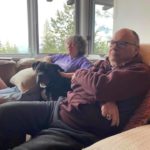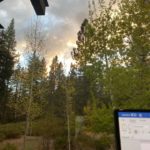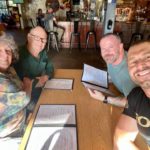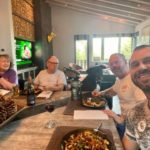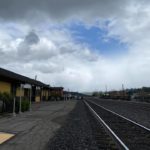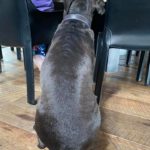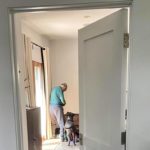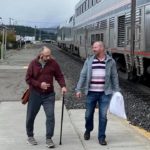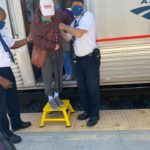a short fictional account
Pop was Pop to his granddaughter Anna, who even at three listened to his every word as a doctor would a heartbeat, but decades earlier Pop was Sargent Ledford leading soldiers through rice paddies and jungles in search of an invisible enemy. For Sargent Ledford, the mission was to keep his men alive. “Leddy,” as they called him with affection, was 24 years old when atop a levee in the Mekong Delta a bullet exploded through the atmosphere not inches from his ear. Three of his men were hit before Sargent Ledford could turn around. The platoon dove for cover under heavy fire, but Sargent Ledford readied his weapon and rushed back up the muddy bank to pull the three fallen soldiers down the hill. This he did without hesitation, and although his tour was full of many such acts, it was after this incident that his soldiers’ eyes glistened when they saluted him or shook his hands, which they did often.
Anna was born just as Pop retired, and with her parents crisscrossing the country for conferences and symposiums, Anna and Pop spent many years together. Anna’s laughter was Pop’s medicine, but when Anna’s silliness turned to curiosity and attentiveness, Pop came to see himself in Anna more so than he ever saw himself in his academic-minded son. And it was this that gave Pop comfort in bringing Anna with him during his home visits as a volunteer hospice worker in Durham, North Carolina. Through doors left ajar, Anna watched Pop at work. She noticed the words he used, his touch, his calm demeanor. Pop always emerged from these darkened rooms and picked Anna up and carried her to the car. It was during these many car rides that Anna listened to Pop talk about being a soldier, the war, his career in the army, and life and death. He told Anna his hospice work gave him a sense of purpose, like he had in the military.
Pop died when Anna was eight. She ran to his car, jumped inside, and refused to get out. But Anna’s young heart healed quickly and Pop faded from her memory. Anna finished school and then college, but with the vigor of an assembly line worker clocking in and clocking out, day after day—ever hounded by her parents to do more with her life. But Anna was content. After college she started work as a manager at a supermarket in Raleigh. She became the general manager after a few years and lived a comfortable life. She dreamed of little more than evenings at home in her apartment and holidays with her parents and extended family. Anna enjoyed the opportunity to talk to her family, now scattered around the country, but she had become adept at steering conversations away from her life.
Anna was 34 when she reached for a bottle of aspirin at work just as it exploded off the shelf. And then a bottle of Tylenol, and then a bottle of Advil, and then Anna hit the ground. Through half-closed eyes she saw others on the ground too, not moving, some moaning, some in growing pools of red. Her fear was secondary to her sense of helplessness. She had to wait. When the silence came, Anna crawled to each pool to do whatever she could do. Anna’s parents were concerned that she would feel guilty for surviving when so many had not. But Anna felt something totally different. Within two years, Anna became a nurse. Within weeks, she developed a reputation for facing the most challenging situations at the hospital.
When the 2020 pandemic hit, Anna volunteered to work double shifts. In April, Anna tuned out the clanging and clapping as she left the hospital for the night, determined to sleep well so she could return early in the morning. By December, her hospital was overwhelmed. In the ICU, Anna watched as Pop after Pop died with only the comfort of her touch. For the first time, Anna was overwhelmed. It was not just the long hours and the endless suffering, but the reemergence of her childhood side by side with Pop. On the curb by the hospital entrance, Anna put her wet face into her hands as Pop came back to her. Anna knew what she had to do. She got up, wiped her face, put her combat gear back on, and returned to the battlefield to tend to the living and the dying.
At home late that night Anna read about the Mekong Delta, words she had just remembered. She learned that it is a place of beauty and life like no other place in the world, a sanctuary for thousands of newly discovered species. She would visit Vietnam a year later and spend three weeks taking in its beauty and history.
